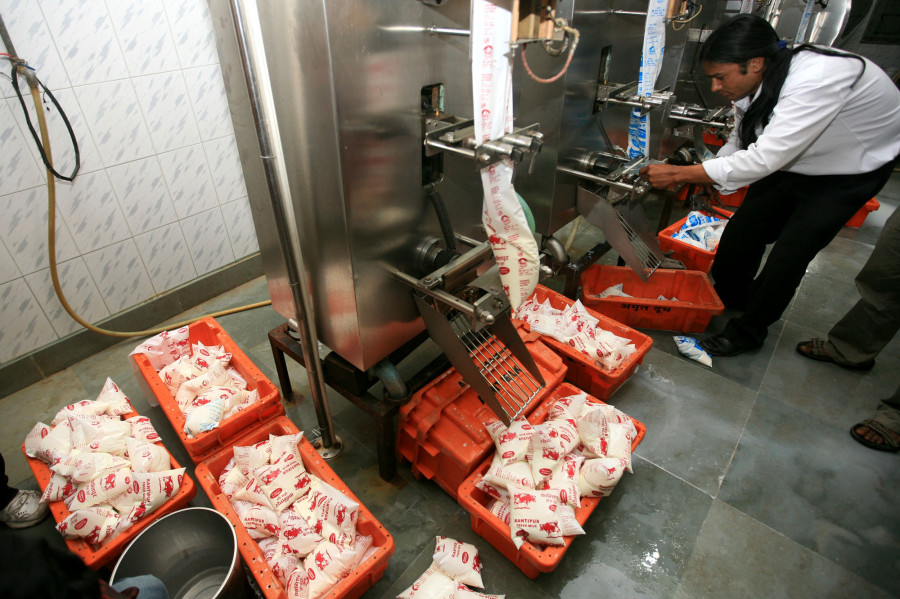Money
Energy Ministry proposes check on power consumption by businesses
The ministry made the move in a bid to encourage usage of energy-efficient technology, machines and equipment to reduce energy imports and curb emissions.
Prahlad Rijal
The Energy Ministry in a draft bill related to energy consumption and saving has proposed to form a Nepal Energy Efficiency and Conservation Board which will monitor the energy consumed by production and service-oriented businesses and enforce measures to make such entities more energy efficient.
Energy efficiency has been defined in the bill as ‘process related to ways of controlling or managing the consumption of power such that the available quantity of fossil fuels, biofuels, electricity is put into optimum utilisation or usage of power is minimised without lowering outputs.
For instance, if a factory is found to have used a machine which can be replaced by similar equipment which consumes less electricity or fuel to produce the same level of output as the machine, the government can ban the use of such machine and ask the factory to replace it with the energy-efficient equipment.
To achieve that, a provision has been proposed in the bill which states that the government can ban the import, trade and use of less energy-efficient equipment.
However, the parameters for gauging the energy efficiency of machines have not been set as no government bodies have been formed to implement the act yet.
The ministry made the move in a bid to encourage usage of energy-efficient technology, machines and equipment to reduce energy imports and curb emissions. It is also aimed at using power in line with the Sustainable Development Goals.
The Sustainable Development Goal 12 requires Nepal to double the average improvement rate of energy efficiency from 0.84 percent per year in 2015 to 1.68 percent per year in 2030.
According to the ministry, to achieve the goal, it is necessary to establish policy, legal and institutional framework that ensures the availability of affordable and reliable energy and its efficient use.
“An ever-increasing import of fossil fuels and electricity has made the condition of energy supply and security extremely weak and vulnerable,” said the Ministry.
The Ministry added that Nepal currently spends nearly all of its foreign earnings on energy imports and that the bill could help address the over-dependence on energy imports.
The rationale of the ministry behind incorporating energy efficiency in law is also backed by facts. Nepal’s gasoline consumption has almost doubled in the last five years, leading to a yawning trade deficit besides causing environmental consequences.
In the last fiscal year alone, Nepal imported gasoline worth massive Rs 214.48 billion and 653 MW of electricity which added Rs 22 billion to the country’s trade burden.
But it is not the first time that the topic of encouraging efficient use has cropped up. The country already has a legal provision.
A provision of Industrial Management Act (2016) has an arrangement on exempting all tax on investment in devices or equipment that help in reducing energy consumption by increasing efficiency.
However, the legal instrument remains to be implemented for lack of regulations, directives and work plans on ways to make the country energy efficient and ascertain criteria related to it.
The bill proposed by the ministry aims to achieve just that.
As per the proposed laws, the responsible government body and energy auditor(s) under the ministry must keep records on monthly energy consumption by commercial entities and factories and commercial complexes. They must also carry out energy inspection of equipment used to consume, produce, transmit and import energy.
The entities under scrutiny would be mainly cement plants, service sector businesses, business houses and complexes, dairy industry, transportation sector, tea industry, sugar industry, paper factories and factories related to aluminium and iron processing among others.
After the assessment, the energy auditor must forward a technical report to the bureau on eliminating the use of high energy-consuming technologies and equipment.
The ministry has also proposed a penalty amounting to half a million rupees if any entity is found to have flouted terms and parameters set by the efficiency board.
However, the entities would not be fined for five years from the date when the act would go into effect.




 22.7°C Kathmandu
22.7°C Kathmandu















